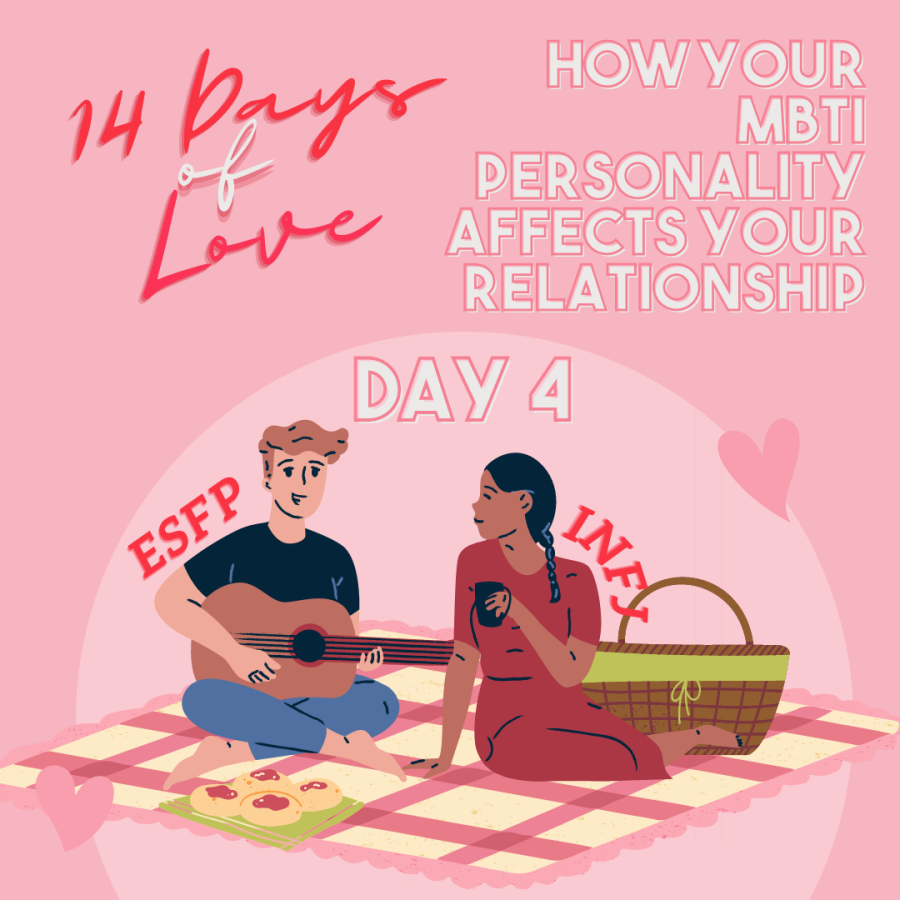14 Days of Love Day 4: INTJ, ENFP, INFP, INFJ…? The 16 Personality Types and How They Affect Your Relationships
February 4, 2022
While a 93-question personality quiz cannot dictate the success of relationships, the Myers–Briggs Type Indicator can provide insight into potential compatibility. The self-reporting assessment produces a total of 16 possible personality types based on the Jung theory — showing that individuals experience everyday life using the four dominant psychological functions known as sensation, intuition, feeling and thinking. But what do these traits mean?
As a means of breaking down each MBTI personality type, the combinations for all 16 possible outcomes displayed in the personality type name are separated into letters standing for each character trait: Extraversion (E) or Introversion (I), Sensing (S) or Intuition (N), Thinking (T) or Feeling (F) and Judging (J) or Perceiving (P). Out of these traits, individuals are assigned one per category reflecting their personal interests, views, inner thoughts and mental perspective.
More specifically, each branch has its own explanation. For example, extraversion and introversion describe how people respond to conflict, communicate with others and interact with the world. Extroverts tend to enjoy more social events and fuel action-based activities, while introverts have more inward tendencies and are thought-oriented.
The next category defines how individuals take in their environment and gather information from their surroundings. Those more prone to sense are known to pay greater attention to facts, specific details and rely on their own senses. Intuitioners pay more attention to repetition, patterns and impressions while also imagining the future along with abstract theories.
The following scale focuses on how individuals make decisions—thinkers rely mostly on objective information and tend to be more reliable and consistent. Those who prefer feeling likely consider others before coming to a conclusion.
The last scale deals with how individuals handle the outside world. Judgers lean more towards structured and firm decisions, while perceivers are more open and flexible.
Although compatibility is not defined solely based on characteristics, the following pairs are the most complementary personality types:
- ISTJ, The Inspector + ESTP, The Persuader
Characterized as ultra-organized problem-solvers, ISTJs thrive on fact-based work. ESTP acts as a great balance to this personality, as ESTPs are realistic, analytic thinkers, but also have great people skills and an energy that can take the team’s work and make it leap off the page. ISTJ makes a great behind-the-scenes powerhouse, while ESTP thrives in the role of entrepreneurship.
- INTP, The Thinker + INTJ, The Architect
INTP and INTJ thrive in highly philosophical conversation and conceptual ways of thinking. These personality types are known to be hyper-logical, but INTP brings an intellectual curiosity that drives innovation that compliments an INTJ’s assertive nature and strength in decision making.
- ENFP, The Champion + INFJ, The Advocate
ENFP personalities — known for their deeply caring and outgoing nature — thrive in service-oriented roles that utilize their gift of creativity. An INFJ is a perfect match for an ENFP due to their natural sensitivity to others and their strength for empathy, combined with a drive to create work with deeper meaning.
- ENTJ, The Commander + ISTP, The Crafter
Strong, natural-born leaders, ENTJs excel at organizational tasks, critical thinking and problem-solving. Although ENTJs are known for being more extroverted, they pair well with the introverted ISTP personalities—tending to have a more analytical and hands-on thinking process with a similar natural strength for problem-solving and a more structural lifestyle.
- ISFP, The Artist + ESFP, The Performer
The natural-born nurturers of the world, ISFPs have loyal, adaptable and highly empathetic personalities, allowing them to sympathize with others’ feelings and personal situations. ESFP has a similar love of helping others, but because of their extroverted tendencies, are more open and energetic, seeking excitement in their work and tapping into their readily available resourcefulness to create something that both serves people and creates buzz.
- ENTP, The Debater + ENFJ, The Giver
The double extroverted pair is destined to last with ENTPs. Known as great problem solvers and natural-born leaders, they compliment ENFJs, who are natural entertainers and also have a natural sense of charisma. Both of these personalities favor group settings, relying on their gift as great communicators.
- ISFJ, The Protector + INFP, The Mediator
Naturally warm and helpful sums up these introverted personalities. ISFJs are extremely skilled at detail-oriented tasks with their effortlessly organized and thoroughness in their work. INFPs pair well with their strong communication skills —specifically in literacy — as well as their creativity and innately inquisitive energy.
- ESFJ, The Caregiver + ESTJ, The Director
Very people-oriented and sociable, ESFJs thrive in interaction and their ability to fulfill the needs of others. These personalities love helping others. As natural leaders, ESTJs live everyday life through a logic-based lens,. and when coupled with their assertiveness, serve as strong partners for ESFJs.










